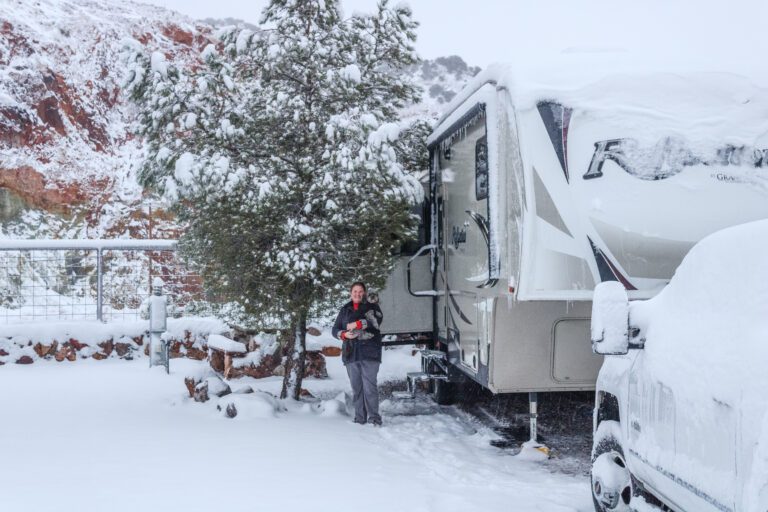This post may contain affiliate links. See our affiliate disclaimer here.
When most people think of RV camping, they think of warm summer days at the campground. However, many RVers want to travel year-round. While, RV camping in winter is more challenging, it can be just as fun. Simply follow these tips for RV camping in cold weather to avoid winter camping disasters.
Contents
How Cold is Too Cold for RV Camping?
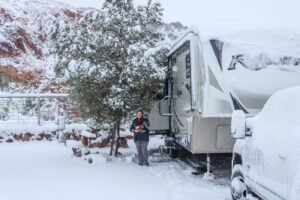
It is definitely possible to camp in cold weather, even in below freezing temperatures. However, most RVs are not built for extreme temperatures.
At any temperature below freezing (32 degrees Fahrenheit), RV owners need to take precautions to prevent their pipes and tanks from freezing. However, there is no exact temperature where RV camping is no longer feasible.
The lower the temperature and the longer below freezing temperatures last, the harder it will be to keep your RV warm and safe. Check the insulation rating on your model and contact the manufacturer to learn what temperatures are appropriate for your specific model.
Tips for Heating an RV in Winter
One of the most important aspects of RV camping in cold weather is keeping the RV warm inside. Use these tricks and hacks to keep your RV toasty inside.
Own a 4 Season RV
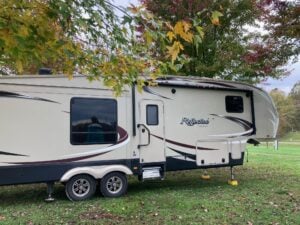
The first way to ensure you are prepared for RV camping in cold weather is to own the right RV. While many RVs are advertised as 4 season models, there is no standard criteria for a 4 season RV.
If you plan to camp in cold weather, look for RVs with the following qualities:
- Sufficient insulation in the walls and ceilings
- Insulation around tanks and/or heated holding tank pads
- Heating in the storage bay
- An enclosed underbelly
- Electric heating option in addition to the propane furnace
Install Skirting around the RV
If you plan to be parked in cold weather for an extended period of time, you should definitely invest in a skirt. An RV skirt is simply vinyl material that is wrapped around the bottom of your RV to keep the underside of the vehicle warm.
The skirt traps warm air under your RV, helping to keep the inside of the camper warm. Additionally the skirt keeps pipes warmer and helps prevent them from freezing.
Insulate Windows
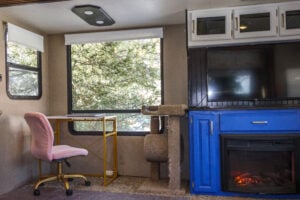
Windows have less insulation than the RV walls, and therefore, allow cold air to enter the RV. Adding additional insulation to windows will help keep your RV warm and comfortable inside.
Many window insulation solutions block natural light and make the RV dark and gloomy. Therefore, a Frost King window insulation kit is perfect for RVs. The insulation is clear and is easily removed when winter is over.
Insulate Slide Outs
Slide outs are another common place where cold air enters RVs. To better insulate your RV’s slides, secure foam insulation board or another type of insulation under the slide outs for added warmth.
Park in the Sun
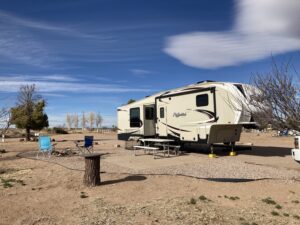
In addition to properly insulating your RV, don’t forget to take advantage of natural heat sources. When RV camping in cold weather, always try to park your RV in an open campsite where the sun will shine directly on your rig.
Place Heavy Rugs in the RV
Another easy way to trap heat in your RV is to place heavy rugs on the floor in the living room and other uncarpeted areas. In addition to help trapping heat inside, the rugs will create a cozier feel inside your RV.
Tips for RV Camping in Cold Weather
The following tips will keep your RV comfortable, dry and in one piece while RV camping in cold weather.
Keep your Pipes from Freezing

One of the biggest challenges of RV camping in freezing temperatures is keeping your pipes from freezing. If you are only experiencing freezing temperatures for a day or two, there are a couple of effective ways to prevent this issue.
The first option is to drip water from the faucet, which helps keep water flowing through your RV pipes. However, when using this method, campers should also ensure their RV hose is either a heated hose or wrapped in heat tape to prevent freezing in below-freezing temperatures.
The second—and often better—option is to disconnect your RV from city water and use the fresh water tank and water pump until temperatures rise above freezing. While it is possible for a fresh water tank to freeze, this is unlikely in RVs with an enclosed underbelly and a running heat source.
Full-time winter campers should take additional precautions to protect their plumbing. For long-term stays in cold weather, RVers should invest in key equipment such as an RV skirt, a high-quality heated hose, and heated tank pads. These tools help insulate and protect the RV’s water system, reducing the risk of freezing and maintaining functionality during extreme cold.
If your RV is being stored in cold weather, the plumbing system needs to be winterized to prevent the pipes and tanks from freezing. See our step-by-step guide to winterizing an RV for more details.
Even if you are not winterizing your RV, you can use non-toxiz RV antifreeze to help prevent liquid in the tanks from freezing. Any plumbing that is not well insulated, such as an outdoor shower, needs to be drained to avoid damage from freezing water.
Use a Dehumidifier
Condensation can be a major problem when RV camping in cold weather. When warm air inside the RV comes into contact with colder surfaces, such as windows, condensation develops.
When camping in cold weather, managing condensation should be a priority. To prevent condensation you need to remove moisture from the air using one or more methods. Running a dehumidifier is the most effective way to remove condensation.
Remove Snow Carefully
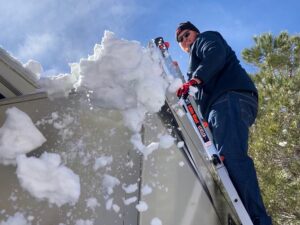
If snow falls on your RV, it should be carefully removed to prevent damage to your RV. Just a few inches of snow can easily cause roof damage.
If the snow melts during the day and re-freezes at night, the expanding water can turn any small crack or leak into major point of entry for water. If there is enough snow accumulation, the weight can also be an issue.
When removing snow, always use a ladder to avoid standing on an icy roof. Use a soft tool, such as a broom or plastic shovel, as sharp, metal shovels may damage your roof.
While snow should be removed, RV owners should allow ice to melt on its own as seams may be damaged while trying to break the ice.
Camp with a Generator
Cold weather and winter storms can often lead to power outages. Therefore, it is always a good idea to have a back-up power source when RV camping in cold weather.
If your RV has an onboard generator, make sure you have enough fuel to run it.
Tips for Traveling in an RV in Winter
Camping in an RV in winter is one thing, but driving in winter weather is a totally different ballgame. Follow these safety tips to stay safe while driving an RV in the winter.
Avoid Ice and Snow
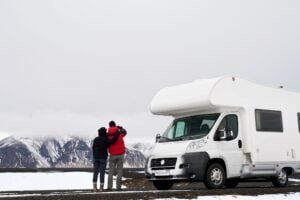
If at all possible, avoid driving your RV in icy or snowy conditions. If you must travel in a cold climate, have flexibility in your schedule so you can easily delay travel during a storm.
Check and Recheck your Tires
Proper tire pressure and quality tires are always important for RV travel. However, having properly maintained tires is even more important in bad conditions. Use a tire pressure monitoring system to continually monitor pressure during travel.
Before driving in winter, it is also important to consider if your tires are built for snow. Many RVs do not come equipped with all season tires. If you plan to drive in winter weather, upgrade your tires to ones that were made for the conditions.
Keep in mind, even all season tires are not made for extreme conditions, such as heavy snow or ice.
Be Prepared to Stop
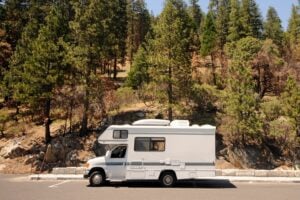
All RV campers traveling in winter should be prepared for unexpected stops. If you unexpectedly encounter winter storms, you may be forced to pull over at a rest stop or another spot without shore power.
Before travel, ensure your propane tanks are full and you have plenty of food and drinking water onboard. Also, make sure your battery is properly maintained and able to hold a charge for at least 24 hours.
Make Reservations in Advance
In areas where the temperatures often drop below freezing, many campgrounds and RV parks close for the winter. When traveling to cold weather destinations, always call in advance to confirm campgrounds are open.
Some campgrounds remain open in the winter, but shut off their water supply to prevent damage. If your campground does not offer water, work in advance to locate the nearest water fill station.
Head South
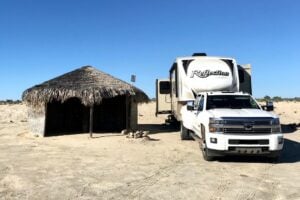
The easiest way to RV in the winter is to head sound to a destination where the temperatures never drop below freezing.
See our list of the 11 best warm weather winter RV destinations for trip ideas!
Essential Gear for RV Camping in Cold Weather
If you plan on RV camping in cold weather, make sure your RV is stocked with the following items.
Heated Water Hose
If your RV is connected to city water in below freezing temperatures, a heated water hose is a must have.
Camco’s heated drinking water hose is a great option for RVers. The hose includes a female-to-male adapter to allow connection to the water supply on either end of hose, depending on the location of your electrical outlet.
Window Insulation Kit
The Frost King window insulation kit allows RV campers to trap in heat without obstructing their views. The sheer insulation can easily be removed once the weather warms up.
Dehumidifier
A dehumidifier removes condensation (and therefore helps prevent mold) when camping in cold weather.
The Hoomifier Dehumidifier has a compact design, but is made to remove moisture in up to 480 square feet, making it perfect for most RVs and trailers.
DampRid Buckets
Another easy way to manage condensation is to place DampRid buckets in areas of the RV where moisture tends to accumulate. Place one in the kitchen and bathroom in addition to using a dehumidifier.
RV Antifreeze
RV antifreeze can be poured into black and grey tanks to help prevent freezing while you are camping. Make sure to always purchase an RV safe brand, such as Splash RV Antifreeze.
Thanks for reading our tips for RV camping in cold weather. We hope you feel better prepared for RVing in winter weather.
Happy Camping!
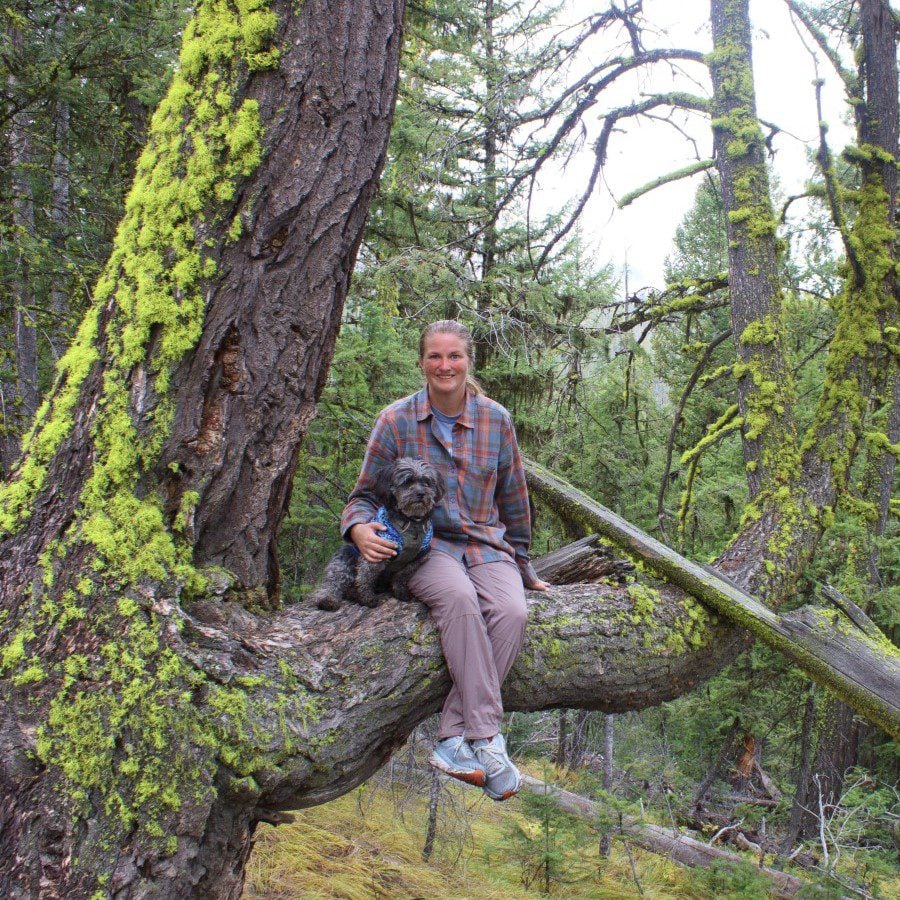
Christina Pate is a seasoned full-time RVer who, along with her husband Justin, has journeyed across the US, Canada, and Mexico. Drawing from her extensive travels, RV repairs and RV renovations, she founded Travels with Ted to guide and inspire fellow RV enthusiasts. Christina is also the co-author of The Owner’s Guide to RV Maintenance and the creator of My RV Log Book.

